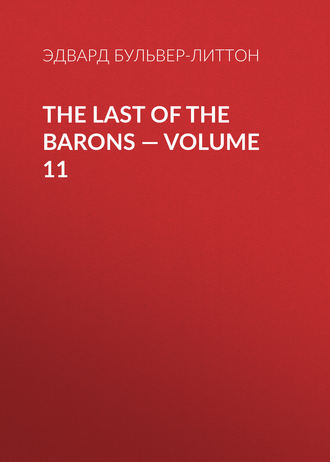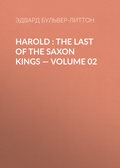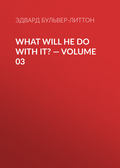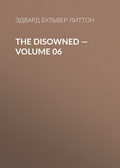
Эдвард Бульвер-Литтон
The Last of the Barons — Volume 11
There was not a department which the chill of this poor king's virtue did not somewhat benumb. The gay youths, who had revelled in the alluring court of Edward IV., heard, with disdainful mockery, the grave lectures of Henry on the length of their lovelocks and the beakers of their shoes. The brave warriors presented to him for praise were entertained with homilies on the guilt of war. Even poor Adam was molested and invaded by Henry's pious apprehensions that he was seeking, by vain knowledge, to be superior to the will of Providence.
Yet, albeit perpetually irritating and chafing the impetuous spirit of the earl, the earl, strange to say, loved the king more and more. This perfect innocence, this absence from guile and self-seeking, in the midst of an age never excelled for fraud, falsehood, and selfish simulation, moved Warwick's admiration as well as pity. Whatever contrasted Edward IV. had a charm for him. He schooled his hot temper, and softened his deep voice, in that holy presence; and the intimate persuasion of the hollowness of all worldly greatness, which worldly greatness itself had forced upon the earl's mind, made something congenial between the meek saint and the fiery warrior. For the hundredth time groaned Warwick, as he quitted Henry's presence,—
"Would that my gallant son-in-law were come! His spirit will soon learn how to govern; then Warwick may be needed no more! I am weary, sore weary of the task of ruling men!"
"Holy Saint Thomas!" bluntly exclaimed Marmaduke, to whom these sad words were said,—"whenever you visit the king you come back—pardon me, my lord—half unmanned. He would make a monk of you!"
"Ah," said Warwick, thoughtfully, "there have been greater marvels than that. Our boldest fathers often died the meekest shavelings. An' I had ruled this realm as long as Henry,—nay, an' this same life I lead now were to continue two years, with its broil and fever,—I could well conceive the sweetness of the cloister and repose. How sets the wind? Against them still! against them still! I cannot bear this suspense!"
The winds had ever seemed malignant to Margaret of Anjou, but never more than now. So long a continuance of stormy and adverse weather was never known in the memory of man; and we believe that it has scarcely its parallel in history.
The earl's promise to restore King Henry was fulfilled in October. From November to the following April, Margaret, with the young and royal pair, and the Countess of Warwick, lay at the seaside, waiting for a wind. [Fabyan, 502.] Thrice, in defiance of all warnings from the mariners of Harfleur, did she put to sea, and thrice was she driven back on the coast of Normandy, her ships much damaged. Her friends protested that this malice of the elements was caused by sorcery, [Hall, Warkworth Chronicle]—a belief which gained ground in England, exhilarated the Duchess of Bedford, and gave new fame to Bungey, who arrogated all the merit, and whose weather wisdom, indeed, had here borne out his predictions. Many besought Margaret not to tempt Providence, not to trust the sea; but the queen was firm to her purpose, and her son laughed at omens,—yet still the vessels could only leave the harbour to be driven back upon the land.
Day after day the first question of Warwick, when the sun rose, was, "How sets the wind?" Night after night, ere he retired to rest, "Ill sets the wind!" sighed the earl. The gales that forbade the coming of the royal party sped to the unwilling lingerers courier after courier, envoy after envoy; and at length Warwick, unable to bear the sickening suspense at distance, went himself to Dover [Hall], and from its white cliffs looked, hour by hour, for the sails which were to bear "Lancaster and its fortunes." The actual watch grew more intolerable than the distant expectation, and the earl sorrowfully departed to his castle of Warwick, at which Isabel and Clarence then were. Alas! where the old smile of home?
CHAPTER IV.
THE RETURN OF EDWARD OF YORK
And the winds still blew, and the storm was on the tide, and Margaret came not when, in the gusty month of March, the fishermen of the Humber beheld a single ship, without flag or pennon, and sorely stripped and rivelled by adverse blasts, gallantly struggling towards the shore. The vessel was not of English build, and resembled in its bulk and fashion those employed by the Easterlings in their trade, half merchantman, half war-ship.
The villagers of Ravenspur,—the creek of which the vessel now rapidly made to,—imagining that it was some trading craft in distress, grouped round the banks, and some put out their boats: But the vessel held on its way, and, as the water was swelled by the tide, and unusually deep, silently cast anchor close ashore, a quarter of a mile from the crowd.
The first who leaped on land was a knight of lofty stature, and in complete armour richly inlaid with gold arabesques. To him succeeded another, also in mail, and, though well guilt and fair proportioned, of less imposing presence. And then, one by one, the womb of the dark ship gave forth a number of armed soldiers, infinitely larger than it could have been supposed to contain, till the knight who first landed stood the centre of a group of five hundred men. Then were lowered from the vessel, barbed and caparisoned, some five score horses; and, finally, the sailors and rowers, armed but with steel caps and short swords, came on shore, till not a man was left on board.
"Now praise," said the chief knight, "to God and Saint George that we have escaped the water! and not with invisible winds but with bodily foes must our war be waged."
"Beau sire," cried one knight, who had debarked immediately after the speaker, and who seemed, from his bearing and equipment, of higher rank than those that followed, "beau sire, this is a slight army to reconquer a king's realm! Pray Heaven that our bold companions have also escaped the deep!"
"Why, verily, we are not eno' at the best, to spare one man," said the chief knight, gayly, "but, lo! we are not without welcomers." And he pointed to the crowd of villagers who now slowly neared the warlike group, but halting at a little distance, continued to gaze at them in some anxiety and alarm.
"Ho there! good fellows!" cried the leader, striding towards the throng, "what name give you to this village?"
"Ravenspur, please your worship," answered one of the peasants.
"Ravenspur, hear you that, lords and friends? Accept the omen! On this spot landed from exile Henry of Bolingbroke, known afterwards in our annals as King Henry IV.! Bare is the soil of corn and of trees, —it disdains meaner fruit; it grows kings! Hark!" The sound of a bugle was heard at a little distance, and in a few moments a troop of about a hundred men were seen rising above an undulation in the ground, and as the two bands recognized each other, a shout of joy was given and returned.
As this new reinforcement advanced, the peasantry and fishermen, attracted by curiosity and encouraged by the peaceable demeanour of the debarkers, drew nearer, and mingled with the first comers.
"What manner of men be ye, and what want ye?" asked one of the bystanders, who seemed of better nurturing than the rest, and who, indeed, was a small franklin.
No answer was returned by those he more immediately addressed; but the chief knight heard the question, and suddenly unbuckling his helmet, and giving it to one of those beside him, he turned to the crowd a countenance of singular beauty at once animated and majestic, and said in a loud voice, "We are Englishmen, like you, and we come here to claim our rights. Ye seem tall fellows and honest.—Standard bearer, unfurl our flag!" And as the ensign suddenly displayed the device of a sun in a field azure, the chief continued, "March under this banner, and for every day ye serve, ye shall have a month's hire."
"Marry!" quoth the franklin, with a suspicious, sinister look, "these be big words. And who are you, Sir Knight, who would levy men in King Henry's kingdom?"
"Your knees, fellows!" cried the second knight. "Behold your true liege and suzerain, Edward IV.! Long live King Edward!"
The soldiers caught up the cry, and it was re-echoed lustily by the smaller detachment that now reached the spot; but no answer came from the crowd. They looked at each other in dismay, and retreated rapidly from their place amongst the troops. In fact, the whole of the neighbouring district was devoted to Warwick, and many of the peasantry about had joined the former rising under Sir John Coniers. The franklin alone retreated not with the rest; he was a bluff, plain, bold fellow, with good English blood in his veins. And when the shout ceased, he said shortly, "We hereabouts know no king but King Henry. We fear you would impose upon us. We cannot believe that a great lord like him you call Edward IV. would land with a handful of men to encounter the armies of Lord Warwick. We forewarn you to get into your ship and go back as fast as ye came, for the stomach of England is sick of brawls and blows; and what ye devise is treason!"
Forth from the new detachment stepped a youth of small stature, not in armour, and with many a weather-stain on his gorgeous dress. He laid his hand upon the franklin's shoulder. "Honest and plain-dealing fellow," said he, "you are right: pardon the foolish outburst of these brave men, who cannot forget as yet that their chief has worn the crown. We come back not to disturb this realm, nor to effect aught against King Henry, whom the saints have favoured. No, by Saint Paul, we come but back to claim our lands unjustly forfeit. My noble brother here is not king of England, since the people will it not, but he is Duke of York, and he will be contented if assured of the style and lands our father left him. For me, called Richard of Gloucester, I ask nothing but leave to spend my manhood where I have spent my youth, under the eyes of my renowned godfather, Richard Nevile, Earl of Warwick. So report of us. Whither leads yon road?"
"To York," said the franklin, softened, despite his judgment, by the irresistible suavity of the voice that addressed him.
"Thither will we go, my lord duke and brother, with your leave," said Prince Richard, "peaceably and as petitioners. God save ye, friends and countrymen, pray for us, that King Henry and the parliament may do us justice. We are not over rich now, but better times may come. Largess!" and filling both hands with coins from his gipsire, he tossed the bounty among the peasants.
"Mille tonnere! What means he with this humble talk of King Henry and the parliament?" whispered Edward to the Lord Say, while the crowd scrambled for the largess, and Richard smilingly mingled amongst them, and conferred with the franklin.
"Let him alone, I pray you, my liege; I guess his wise design. And now for our ships. What orders for the master?"
"For the other vessels, let them sail or anchor as they list. But for the bark that has borne Edward king of England to the land of his ancestors there is no return!"
The royal adventurer then beckoned the Flemish master of the ship, who, with every sailor aboard, had debarked, and the loose dresses of the mariners made a strong contrast to the mail of the warriors with whom they mingled.
"Friend," said Edward, in French, "thou hast said that thou wilt share my fortunes, and that thy good fellows are no less free of courage and leal in trust."
"It is so, sire. Not a man who has gazed on thy face, and heard thy voice, but longs to serve one on whose brow Nature has written king."
"And trust me," said Edward, "no prince of my blood shall be dearer to me than you and yours, my friends in danger and in need. And sith it be so, the ship that hath borne such hearts and such hopes should, in sooth, know no meaner freight. Is all prepared?"
"Yes, sire, as you ordered. The train is laid for the brennen."
"Up, then, with the fiery signal, and let it tell, from cliff to cliff, from town to town, that Edward the Plantagenet, once returned to England, leaves it but for the grave!"
The master bowed, and smiled grimly. The sailors, who had been prepared for the burning, arranged before between the master and the prince, and whose careless hearts Edward had thoroughly won to his person and his cause, followed the former towards the ship, and stood silently grouped around the shore. The soldiers, less informed, gazed idly on, and Richard now regained Edward's side.
"Reflect," he said, as he drew him apart, "that, when on this spot landed Henry of Bolingbroke, he gave not out that he was marching to the throne of Richard II. He professed but to claim his duchy,—and men were influenced by justice, till they became agents of ambition. This be your policy; with two thousand men you are but Duke of York; with ten thousand men you are King of England! In passing hither, I met with many, and sounding the temper of the district, I find it not ripe to share your hazard. The world soon ripens when it hath to hail success!"
"O young boy's smooth face! O old man's deep brain!" said Edward, admiringly, "what a king hadst thou made!" A sudden flush passed over the prince's pale cheek, and, ere it died away, a flaming torch was hurled aloft in the air; it fell whirling into the ship—a moment, and a loud crash; a moment, and a mighty blaze! Up sprung from the deck, along the sails, the sheeted fire,—
"A giant beard of flame." [Aeschylus: Agamemnon, 314]
It reddened the coast, the skies, from far and near; it glowed on the faces and the steel of the scanty army; it was seen, miles away, by the warders of many a castle manned with the troops of Lancaster; it brought the steed from the stall, the courier to the selle; it sped, as of old the beacon fire that announced to Clytemnestra the return of the Argive king. From post to post rode the fiery news, till it reached Lord Warwick in his hall, King Henry in his palace, Elizabeth in her sanctuary. The iron step of the dauntless Edward was once more pressed upon the soil of England.







